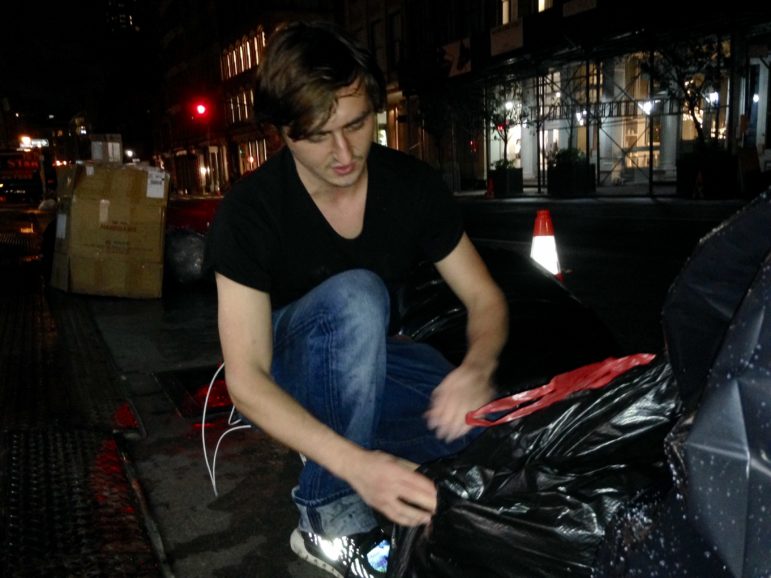
Samantha Maldonado
Vladimir only makes a small tear in the bags he investigates so as to keep the garbage neat. Otherwise, stores can get fines.
When night falls, 24-year-old Vladimir begins to eye the lumps of trash bags piled on SoHo’s sidewalks. Passers-by might assume he is homeless until they notice his wireless Apple earbuds. By selling items he finds in the trash on his eBay account, he makes enough money to pay the $1,300 monthly rent for his Brooklyn studio and then some.
Vladimir, who requested his last name remain private, is one of an unknown number of people who head to the swankiest parts of the city each night to scrounge for the discarded goods of luxury stores and wealthy residents. This scavenger hunt is part of a thriving, underground economy. Although the pursuit has traditionally been about finding necessities, online sites and flea markets allow people to easily profit from once-trashed treasures.
“There are all sorts of ways you can turn salvaged or scrounged stuff into money,” says Jeff Ferrell, professor of sociology and anthropology at Texas Christian University and a dumpster diver for 40 years.
“Dumpster diving is the perfect mix of adventure and good environmental politics,” Ferrell says. He sees dumpster diving as material confirmation of the growing divide between the affluent and poor, and proof of conspicuous hyper-consumption.
“It’s a very revealing phenomenon that there’s enough usable wasted goods to live off of and that some people are forced to because of poverty,” he says.
Vladimir is a professional when it comes to scrounge-to-money alchemy. He makes sure to keep the trash neat to prevent stores from being fined. He’s developed an ability to know what’s in a bag before opening it.
“A purse would have a rough, smooth texture. You would feel a zipper. You would feel the rigid bumps all across,” Vladimir says. “Clothing has this kind of soft feel, this squishiness, and a warm feeling.” If the squishiness is wet and cold, that’s probably food—or diapers.
Five hours after he set out on a recent night, Vladimir took an Uber home carrying Lancome perfume bottles, Wild Fox eyeglass cases and a suitcase packed with clothing. “It’s pretty fun,” he says.
Jerome Armour has been in the business of “finding stuff,” as he calls it, for the last two years. He and his wife ran a store called Natisha and Armour Millinery until it closed in 2005, and then he sold hats as a street vendor until it was no longer profitable. Now, Armour, 69, starts his nights in SoHo and then moves to different areas. “The east side is better than the west side,” he says. “On the east side it’s the billionaires, on the west side it’s the millionaires.”
Armour packs his finds—recently, a wrought-iron cat sculpture, kitchenware, fabric, a golden spotlight on a tripod, mostly likely from a movie shoot, and a gleaming globe—into his 2003 Ford, which he bought for $350 using money from cans he collected. On weekends, he drives to fairs in the tri-state area like New Meadowlands Market, Elephant’s Trunk Country Flea Market and Stormville Flea Market.
Although removing trash from public property is not a criminal act in New York state, dumpster divers risk being fined $100 for disturbing or removing waste, and more if they trespass on private property. But Armour doesn’t worry.
“New York is an adult playground. You can get away with anything as long as you don’t get caught,” Armour says. “You can find a hustle. You can sell anything.”








